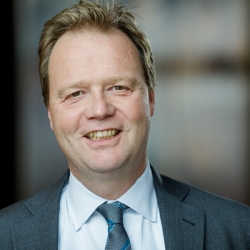Discover more about the topics and technologies that were discussed at the 2019 conference, via a series of exclusive interviews with a selection of our expert speakers.
 Eric Mink, program manager of MaaS at The Ministry of Infrastructure and Water Management in the Netherlands, talks about the importance of Mobility as a Service, and why cooperation is vital in its successful implementation.
Eric Mink, program manager of MaaS at The Ministry of Infrastructure and Water Management in the Netherlands, talks about the importance of Mobility as a Service, and why cooperation is vital in its successful implementation.
What is your presentation about?
We are starting seven national MaaS pilot programs in the Netherlands. Together with seven regions, my team has kicked off these pilots based on a harmonized definition, but each with their own policy goals or target groups. MaaS in the Netherlands is a means, not an end. Five of the seven pilots have now been awarded via tenders. The Netherlands is working on standardization in order to create an ecosystem where a level playing field for MaaS service providers and transport operators is guaranteed.
Tell us about your pilot projects. What did they look at, and what were the results?
The pilots will start in the first half of 2020. So far, a lot of effort has been put into the consultation, tendering and standardization processes, and in the creation of a joint learning environment. We started out with a framework agreement whereby all 24 international consortia have agreed to share their data with governments and transport operators, and aim to learn together what the behavioral effects of MaaS are. This is exciting, especially because we are starting the first national MaaS apps. Based on the data, the Netherlands is aiming for real-time optimization of the mobility system on policy goals such as sustainability, traffic jams, occupancy ratios for public transport and accessibility of rural areas.
Why is standardization important in MaaS?
MaaS is about giving new travel opportunities to people. With standardization it becomes easier for small transport companies to be found in MaaS apps. Without standardization, we would be heading toward winner-takes-all scenarios and integrated monopolies. Furthermore, scale is important for apps. Standardization allows for open markets, ecosystems, scale and cross-border cooperation.
Working with so many private companies sounds complicated – what were the challenges, and what were the benefits?
Everybody needs to realize that in the new ecosystem economy, it is all about sharing data. Sharing data between transport operators – big and small – will increase the cake for transport operators and MaaS providers. Not sharing means that your piece of the cake will decrease. Making everyone realize this and changing the winner-takes-all mentality into a cooperative-ecosystem mentality is a huge challenge. Public-private partnerships are the future, however – especially given the challenges ahead on issues like the Paris Climate Agreement.
Is there any advantage in creating partnerships with companies outside the Netherlands?
Absolutely. Journeys do not stop at borders anymore. That is also a reason for standardization and cooperation. MaaS won’t work if we have to download a different app every time we visit a new city or country. Scale is important for the business case of MaaS providers. Public value and policy are important for governments. We have to cooperate as public and private parties. And finally, we can learn a lot from experiences in other countries.
Don't miss Eric Mink's presentation, Toward open MaaS and optimization: impact on (future) policy as part of Day 2 of Stream 6: Mobility as a Service at The Future of Transportation World Conference. For an up-to-date program, click here. To book your delegate pass, click here.